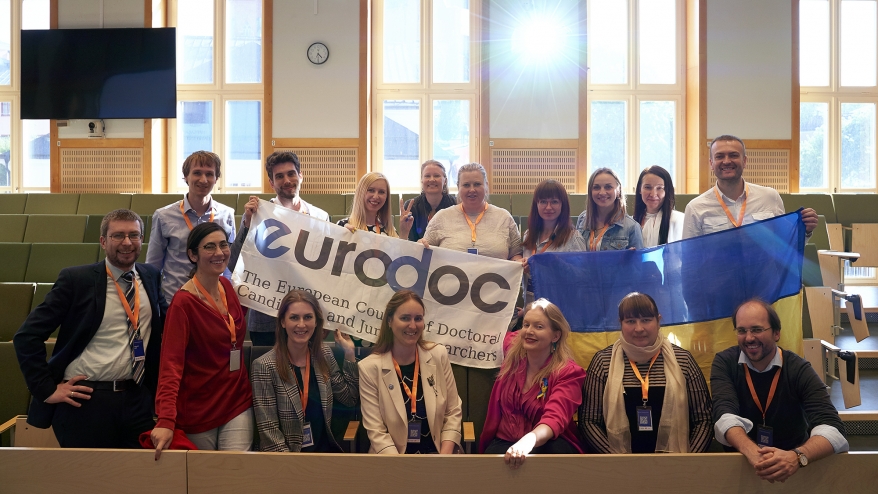As the European Council of Doctoral Candidates and Junior Researchers (Eurodoc), we represent the grassroots level of the generation of scientists across Europe who will teach and conduct research for the coming years. This is the generation of researchers who will shape the higher education sector for the decades to come. In Ukraine, this is exactly the generation whose continuation in academia is currently under extreme jeopardy. Under circumstances impossible to imagine, they continue their research and the teaching of students – they keep the universities functioning. They are central for the education of the next generation of doctors, of teachers, of engineers, of researchers, in brief, of citizens. Higher education educates itself, and it educates the rest of the educational system as well.
Therefore, when the Young Scientist Council of Ukraine at the Ministry of Education and Science of Ukraine1 reached out to the president and vice-president of Eurodoc to visit them in Kyiv in order to get an on-site impression of the current situation, Sebastian Dahle, president of Eurodoc, and Pil Maria Saugmann, vice president of Eurodoc, accepted the invitation. Both the administrative board and the advisory board of Eurodoc deemed this visit to be a crucially important chance to put focus on the central, but easily forgotten role of research and education for democracy and for the recovery of Ukraine as a knowledge economy. Thus, Pil Maria Saugmann, vice president of Eurodoc, emphasises: “I agreed to do this, because I see it as one of our core responsibilities to emphasise the role that research and higher education play for democracy and society – and for Ukraine this is particularly acute right now.”
In particular, Eurodoc maintains that a sustainable recovery of Ukraine must include the higher education sector with three foci:
- the support and funding of the higher education institutions;
- the needs of the individual academics and students;
- the role of education and research in society.
Accordingly, Eurodoc’s visit in Kyiv includes meetings with diverse stakeholders to address exactly these three levels of support for Ukrainian academia, namely the institutional, the individual, and the societal. Dahle and Saugmann will meet amongst others with the National Research Foundation of Ukraine, with representatives of the 24 regional young scientist councils, as well as with the Science Museum in Kyiv. Sebastian Dahle, president of Eurodoc, explains: “This visit is a continuation of Eurodoc’s numerous efforts to support our Ukrainian colleagues and friends since the first days of the invasion. This is particularly important since in the currently planned international support and recovery schemes for Ukraine, the higher education sector has not received much attention.”
Eurodoc hopes to deliver an important impulse to European politics and the public: The Ukrainian higher education sector has a crucial role to play for Ukraine’s recovery and democracy, and thus needs to receive the necessary support and funding. Yet, the European Funding schemes intended to support Ukrainian researchers mainly aim at allowing them to continue their research career in other European countries2. It is paramount that the higher education institutions and the researchers in Ukraine are equally considered in the EU Recovery Fund for a sustainable recovery of Ukraine 3,4,5.
For further information or inquiries, please reach out to Hannah Schoch, Eurodoc Secretary, hannah.schoch@eurodoc.net
1 The Council of Young Scientists at the Ministry of Education and Science of Ukraine
2 How to keep studying during the Ukraine situation
3 EU Solidarity with Ukraine. The EU stands united with Ukraine
5 EU Solidarity with Ukraine. Recovery and reconstruction of Ukraine

